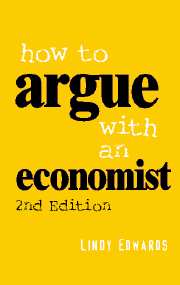Book contents
- Frontmatter
- Contents
- Acknowledgements
- Preface to the Second Edition
- Part I A Historical Juncture
- Part II Getting a Handle on Economics
- Part III Revealing Economic Rationalism's Worldview
- Part IV Arguing with an Economic Rationalist
- 11 How to argue with an economic rationalist
- 12 Reclaiming responsibility
- 13 Arguing about economic efficiency
- 14 Arguing about quality of life
- 15 Aruging about justice
- Part V The Future
- Bibliography
- Index
13 - Arguing about economic efficiency
Published online by Cambridge University Press: 14 October 2009
- Frontmatter
- Contents
- Acknowledgements
- Preface to the Second Edition
- Part I A Historical Juncture
- Part II Getting a Handle on Economics
- Part III Revealing Economic Rationalism's Worldview
- Part IV Arguing with an Economic Rationalist
- 11 How to argue with an economic rationalist
- 12 Reclaiming responsibility
- 13 Arguing about economic efficiency
- 14 Arguing about quality of life
- 15 Aruging about justice
- Part V The Future
- Bibliography
- Index
Summary
Debate has raged over tariff reductions and free trade, microeconomic reforms, privatisation, and shifts to user pays. Some pundits insist that leaving it to the market won't deliver a healthy economy. But economic rationalists insist it will. This is the first and most powerful place to start arguing with an economic rationalist. It is the debate over whether the market actually achieves economic efficiency. Does the market do what it claims to do? It is easy to get into this spat because it is stuff economic rationalists already argue about. There is a clearly established framework for analysing the problem, and, of course, if you can come up with an economic reason why an economic policy is wrong, the economic rationalist is left without anywhere to stand.
The previous chapter explained that any argument with an economic rationalist turns on whether the market or governments are best equipped to bring about the communities we want to live in. It is a question of whether the market will harness our selfish natures to deliver the best outcomes for all, or whether human beings have to co-operate, plan and consciously author their communities. Fortunately economics has a framework for having this argument. It acknowledges that the market fails and it believes that governments also fail. To convince an economic rationalist that governments should get into the act, you must first convince them that the market fails and, second, that government involvement won't make things worse.
- Type
- Chapter
- Information
- How to Argue with an EconomistReopening Political Debate in Australia, pp. 111 - 126Publisher: Cambridge University PressPrint publication year: 2007

